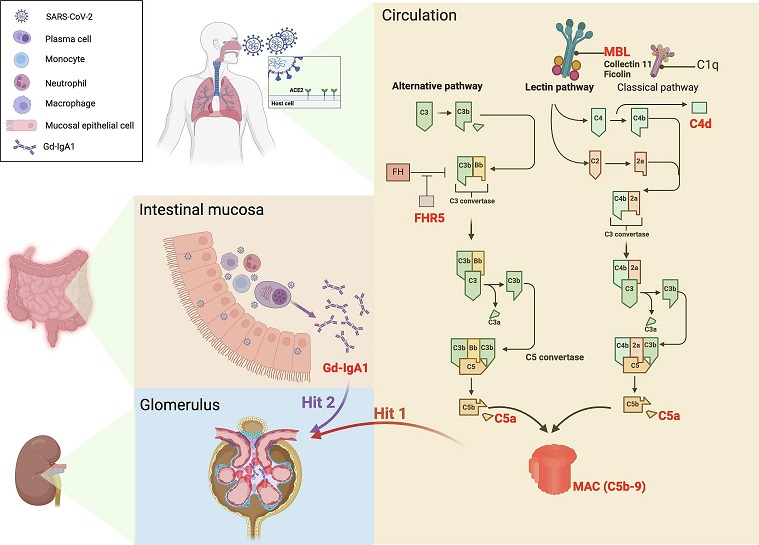Post COVID-19 Individuals With IgA Nephropathy Found To Have Overactivated Complement System!
Nikhil Prasad Fact checked by:Thailand Medical News May 06, 2024 11 months, 2 weeks, 6 days, 5 hours, 37 minutes ago
COVID-19 News: In the wake of the COVID-19 pandemic, medical researchers worldwide have been unraveling the complex interplay between the SARS-CoV-2 virus and various autoimmune conditions. One such condition that has garnered attention is IgA nephropathy (IgAN), a form of glomerulonephritis characterized by complement-mediated autoimmune responses. Recent studies, including research conducted at Beijing Anzhen Hospital, Capital Medical University, China, have shed light on the clinical and immunological characteristics of IgAN patients following COVID-19 infection. This
COVID-19 News report delves into the intricate details of this association, focusing on the overactivation of the complement system in IgAN patients post-COVID-19.
 Putative pathogenesis of IgAN after SARS-CoV-2 infection. The putative mechanism of the pathogenetic mucosal immune responses to SARS-CoV-2 infection in contributing to IgAN progression. For patients with IgAN after COVID-19, mucosal immune responses to SARS-CoV-2 infection may result in the overactivation of systemic and renal local complement system (the first hit) and increased glomerular deposition of Gd-IgA1 (the second hit). We postulate that both hits, as a consequence, may lead to renal dysfunction and promote renal progression in IgAN.
IgA Nephropathy and its Association with Mucosal Infections
Putative pathogenesis of IgAN after SARS-CoV-2 infection. The putative mechanism of the pathogenetic mucosal immune responses to SARS-CoV-2 infection in contributing to IgAN progression. For patients with IgAN after COVID-19, mucosal immune responses to SARS-CoV-2 infection may result in the overactivation of systemic and renal local complement system (the first hit) and increased glomerular deposition of Gd-IgA1 (the second hit). We postulate that both hits, as a consequence, may lead to renal dysfunction and promote renal progression in IgAN.
IgA Nephropathy and its Association with Mucosal Infections
IgA nephropathy (IgAN) is recognized as the most prevalent primary glomerulonephritis globally and a leading cause of kidney failure. It is often triggered by mucosal infections, with respiratory, gastrointestinal, and urinary tract infections being common culprits. The hallmark features of IgAN include recurrent episodes of gross hematuria and/or proteinuria, frequently occurring after mucosal infections. The emergence of COVID-19, primarily a respiratory illness, has sparked interest in understanding its impact on kidney health, especially in individuals predisposed to IgAN.
COVID-19 and Kidney Involvement: A Multi-Faceted Challenge
COVID-19, caused by the novel coronavirus SARS-CoV-2, has not only posed challenges to respiratory health but has also been implicated in kidney damage through various mechanisms. Direct interaction with the angiotensin-converting enzyme 2 (ACE2) receptor, abnormal immune responses, and complement system activation are among the pathways through which SARS-CoV-2 affects renal function.
Notably, COVID-19 has been linked to the development of glomerulonephritis, including IgAN, adding complexity to the spectrum of post-infection complications.
The Role of Complement System in COVID-19 and IgAN
The complement system, a pivotal component of innate and acquired immunity, plays a dual role in responding to viral infections. While essential for initial antiviral defense, excessive or prolonged complement activation can exacerbate disease progression. Studies have highlighted th
e activation of the complement system during SARS-CoV-2 infection, particularly in patients with severe clinical manifestations. Notably, complement components such as C5a and soluble C5b-9 have been implicated in organ damage, including renal impairment.
Investigating Complement Activation in IgAN Post-COVID-19
Research conducted at Beijing Anzhen Hospital delves into the complement system's role in IgAN patients following COVID-19 infection. A comparative analysis between IgAN patients with and without COVID-19 revealed significant differences in complement component levels, particularly C5a, soluble C5b-9, and FHR5. These findings underscore the potential overactivation of systemic and renal complement pathways in IgAN post-COVID-19, contributing to renal dysfunction and disease progression.
Clinical and Immunological Characterization of IgAN Patients Post-COVID-19
The study cohort comprised IgAN patients who experienced COVID-19, exhibiting distinctive clinical and histological features. Notably, these patients presented with elevated levels of complement components, mesangial hypercellularity, segmental glomerulosclerosis, and increased glomerular deposition of Gd-IgA1, all indicative of complement-mediated renal injury. Moreover, the presence of SARS-CoV-2 nucleocapsid antigen in renal tubular epithelial cells correlated with heightened IgA levels, emphasizing the interplay between viral infection and immune dysregulation in IgAN pathogenesis.
Implications for Future Therapeutic Strategies
The findings from this study highlight the need for vigilant monitoring and long-term follow-up in IgAN patients post-COVID-19, given the heightened risk of renal progression. Furthermore, targeting complement system mediators emerges as a potential therapeutic avenue to mitigate renal damage and improve outcomes in this patient population. Strategies aimed at modulating complement activation may hold promise in attenuating the deleterious effects of viral-induced immune responses in IgAN.
Conclusion
In conclusion, the study elucidates the intricate interplay between COVID-19 infection, complement system activation, and renal injury in IgAN patients. By unraveling the immunological mechanisms underlying post-viral autoimmune responses, the research paves the way for targeted interventions and personalized management strategies in IgAN patients following SARS-CoV-2 infection. Continued research in this domain is imperative to optimize clinical outcomes and enhance our understanding of autoimmune sequelae in the aftermath of viral infections.
The study findings were published in the peer reviewed journal: Clinical Immunology.
https://www.sciencedirect.com/science/article/pii/S1521661624003413
For the latest
COVID-19 News, keep on logging to Thailand Medical News.
Read Also:
https://www.thailandmedical.news/news/covid-19-associated-nephropathy-an-emerging-health-threat
https://www.thailandmedical.news/news/breaking-news-gene-study-reveals-how-covid-19-mrna-vaccine-leads-to-high-risk-of-iga-nephropathy-eventual-kidney-failure-and-possible-cancers
